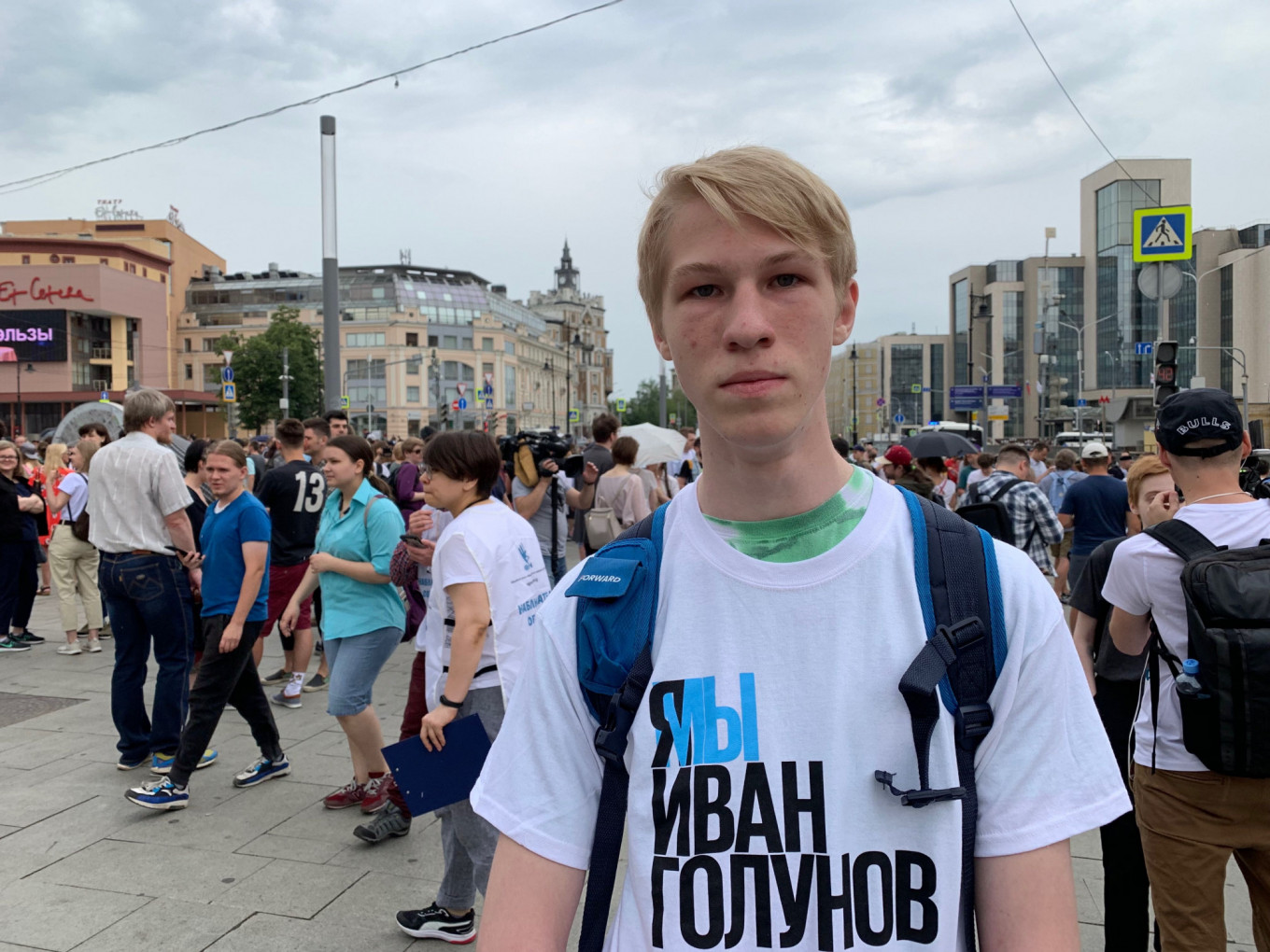Police arrested more than 400 protesters in Russia’s capital on Wednesday during a march calling for the punishment of those responsible for the arrest of an investigative reporter on trumped-up drug charges.
The march, which was not authorized by the authorities, had been planned to call for the release of Ivan Golunov, a Moscow-based investigative reporter with the Latvia-based Meduza news site. But after police dropped all charges against him on Tuesday in a surprise pivot following an unprecedented public outcry, more than 1,000 protesters demanded that those responsible for his arrest should be held to account, and raised their voices for lesser-known Russians detained under similar circumstances.
“Today is Russia Day isn’t it?” said Elena Stepanova, a 60-year-old pensioner, referring to the June 12 holiday celebrating Russia’s sovereignty instituted after the collapse of the Soviet Union. “Well, we’re here to call for true independence — from those who would limit our rights.”
Golunov’s arrest last Thursday had sparked mass outrage. As one of Russia’s most prolific investigative journalists, his defenders believed he had been targeted for his investigations through fabricated charges. In court, Golunov attested that he had received threats for working on his latest article on corruption in the funeral business, which he had filed the day of his arrest.
Over the weekend and into this week, hundreds picketed outside Moscow’s police headquarters. On Monday, Russia’s three main business dailies — Kommersant, RBK and Vedomosti — ran matching cover pages reading: “I am/We are Ivan Golunov.” Even some state-supported journalists and high-profile celebrities came to the reporter’s side, calling for justice in his case.
On Tuesday, Russia’s Interior Ministry dropped the case in a surprise about-face after a slew of evidence showed that the drugs could not have been Golunov’s. The decision came against a backdrop of authorities nervous about social unrest as Russian President Vladimir Putin faces dissatisfaction over living standards. The Interior Minister Vladimir Kolokoltsev also said he had suspended the police officers involved pending an investigation, and that he would ask Putin to sack two high-ranking Moscow police generals over the case.
 Ilya Bolunov, 17, wears a T-shirt reading “I am/We are Ivan Golunov.” Evan Gershkovich / MT
Ilya Bolunov, 17, wears a T-shirt reading “I am/We are Ivan Golunov.” Evan Gershkovich / MTBut many of the protesters at Wednesday’s march said they felt a responsibility to keep the momentum that had built up over the past week going to ensure that those responsible for Golunov’s arrest would be held accountable. Although the authorities have sanctioned a protest to take place on June 16, marchers told The Moscow Times they believed the move aimed to provide them with an outlet for their anger.
“They are trying to cool us off,” said 17-year-old Ilya Bolunov. “But we’re here today to make clear that we haven’t forgotten about all of the other people who are sitting in jail on the same charges as Ivan, who are less famous.”
Winding through central Moscow toward the police headquarters on Petrovka Street, protesters, many of whom wore T-shirts reading “I am/We are Golunov,” chanted for the annulment of Article 228 of Russia’s Criminal Code, under which Golunov was arrested. They also called for the freedom of political prisoners, including an aide to opposition politician Alexei Navalny, Leonid Volkov, who has spent more than a month in prison for protests organized by Navalny in September.
Navalny himself joined the protest, but was soon detained.
“The authorities got terribly scared of the fantastic and unanimous expression of solidarity over the Golunov case,” he tweeted soon after. “That’s why it’s important for them to first destroy the common solidarity and then to intimidate and imprison those who continue insisting.”
Along the planned route toward Petrovka, police set up barricades and used street-cleaning trucks to spray down marchers in an effort to get them to disperse. They also detained more than 400 protesters, including scores of journalists and two of the march’s organizers, according to the police-monitoring OVD-Info website. Many of the arrests were violent.
The result was several disjointed groups of protesters walking down central Moscow’s streets with the police trying to keep up until they eventually all dispersed, after several hours. About two hours after the start of the march, one of the remaining groups of protesters walked toward the Kremlin, chanting: “Russia without Putin.”
There, Putin was giving a reception in honor of Russia Day. Although the president didn’t mention Golunov in his remarks, a young woman had managed to get a front seat, wearing one of the T-shirts reading: “I am/We are Ivan Golunov.”
